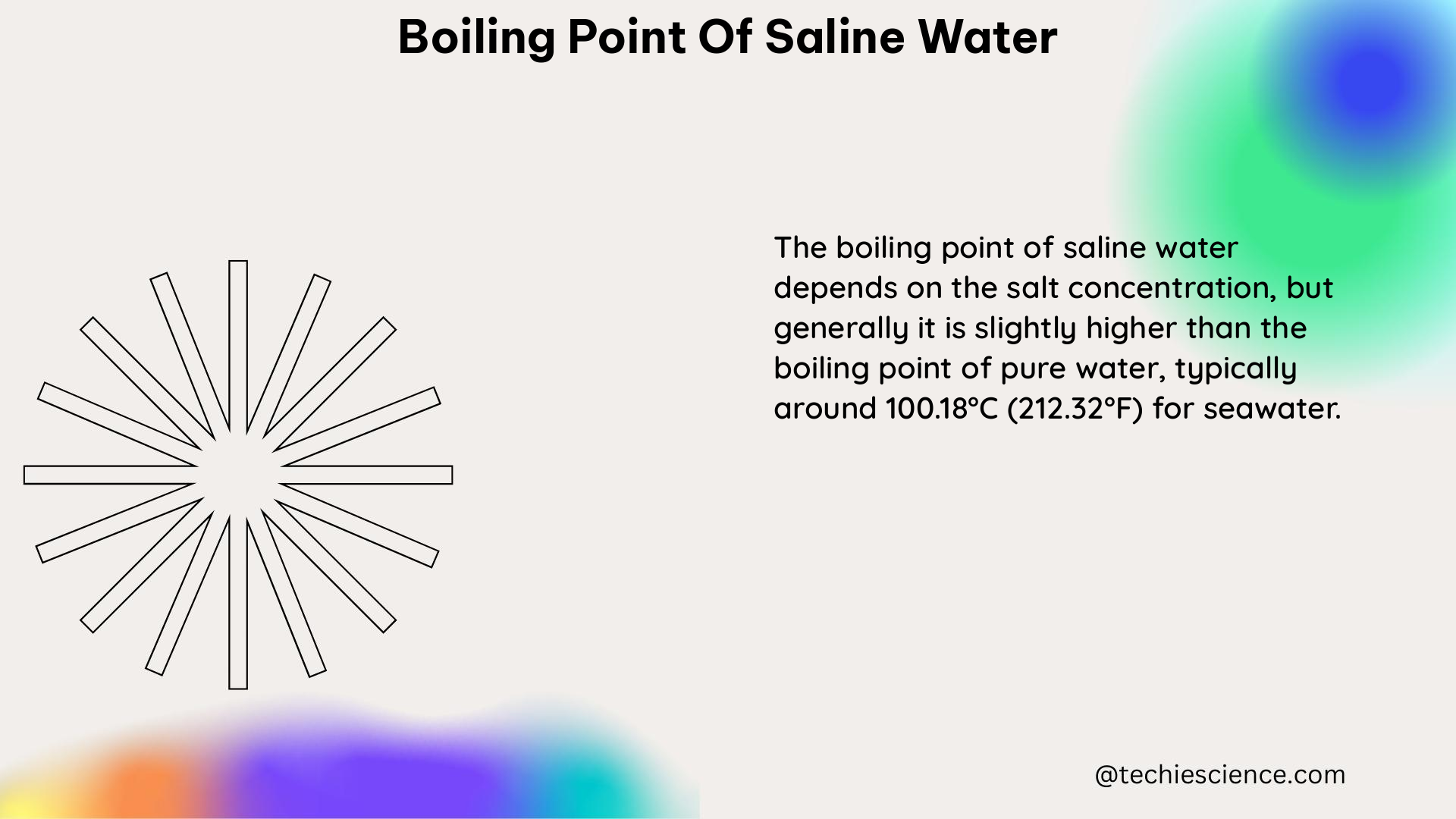The boiling point of saline water is a crucial parameter in various scientific and industrial applications, from desalination processes to food preparation. The presence of dissolved salts in water alters the boiling point, and understanding this relationship is essential for accurate measurements and calculations.
The Influence of Salt Concentration on Boiling Point
The boiling point of saline water is directly influenced by the amount of salt present in the solution. As the salt concentration increases, the boiling point of the solution also rises. This phenomenon is known as boiling point elevation, and it can be quantified using the following formula:
$\Delta T_b = K_b \cdot m$
Where:
– $\Delta T_b$ is the change in boiling point (in °C)
– $K_b$ is the boiling point elevation constant, which depends on the solvent (for water, $K_b = 0.512$ °C/m)
– $m$ is the molality of the solute (in mol/kg)
For low salt concentrations, the boiling point increase is linear with respect to the salt concentration. However, as the salt concentration increases, the interactions between the salt ions begin to reduce the effect, causing the boiling point increase to deviate slightly from the linear trend.
Experimental Data on Boiling Point Elevation
A study conducted by Western Governors University investigated the effect of sodium chloride (NaCl) on the boiling point of water. The results are summarized in the following table:
| Salt Concentration | Boiling Point (°C) |
|---|---|
| 10% NaCl solution | 100.58 |
| 20% NaCl solution | 101.16 |
As the data shows, the boiling point of the 20% NaCl solution is higher than the 10% NaCl solution, demonstrating the direct relationship between salt concentration and boiling point elevation.
Measuring the Boiling Point of Saline Water

Accurately measuring the boiling point of saline water requires careful attention to the measurement techniques and equipment used. Here are some key considerations:
Thermometer Accuracy and Precision
When measuring the boiling point of saline water, it is crucial to use thermometers that are accurate and precise enough to capture even small changes in temperature, such as half-degree changes. Digital thermometers with a wide range (e.g., 212 °F to 240 °F) are recommended for this purpose.
Experimental Setup
The experimental setup for measuring the boiling point of saline water should ensure that the thermometer is properly positioned to accurately measure the temperature of the boiling solution. Factors such as the depth of the thermometer, the location within the solution, and the presence of any bubbles or turbulence can all affect the measured boiling point.
Minimizing Measurement Errors
To minimize measurement errors, it is important to follow standard experimental protocols and techniques. This may include:
– Ensuring the solution is well-mixed and homogeneous
– Allowing the solution to reach a stable boiling point before taking measurements
– Repeating measurements multiple times to obtain an average value
– Calibrating the thermometer before and after each set of measurements
Boiling Point of Solutions with Multiple Solutes
The boiling point of a solution containing water, salt, and other solutes (such as sugar) can be determined using an equation developed by upper-grade students. This equation would take into account the individual contributions of each solute to the overall boiling point elevation.
By understanding the effects of each solute on the boiling point, students can develop methods to minimize measurement errors and determine the relative impact of each solute on the final boiling point of the solution.
Conclusion
The boiling point of saline water is a measurable and quantifiable parameter that is influenced by the amount of salt present in the solution. By using accurate and precise measurement techniques, the boiling point of saline water can be determined and used in various calculations and equations to understand the properties of different solutions.
Reference:
– Boiling Point Elevation of Saline Water
– The Effects of Sodium Chloride on Boiling Point of Water
– Concentration Activity: Boiling Point of Salt Water

The lambdageeks.com Core SME Team is a group of experienced subject matter experts from diverse scientific and technical fields including Physics, Chemistry, Technology,Electronics & Electrical Engineering, Automotive, Mechanical Engineering. Our team collaborates to create high-quality, well-researched articles on a wide range of science and technology topics for the lambdageeks.com website.
All Our Senior SME are having more than 7 Years of experience in the respective fields . They are either Working Industry Professionals or assocaited With different Universities. Refer Our Authors Page to get to know About our Core SMEs.